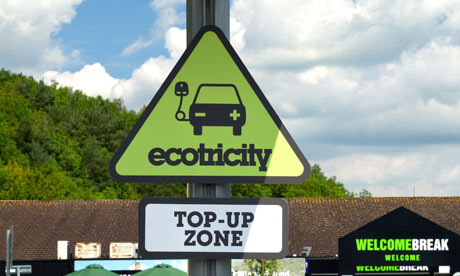It’s actually the world’s first national charging network for electric cars. That may sound a bit grand, for something quite wonderfully simple – a series of charging posts installed at motorway services up and down the country. Charging stations, for electric cars, that are easy to access and free to use (yes free). Enabling Britain’s electric car drivers to drive the length and breadth of the country – with all the convenience of simply pulling into a motorway service station to top up. We’re pretty chuffed with it, truth be told.

You may have read about already it in the Sunday Times this weekend. You shouldn’t have, but they broke the embargo on our story three days early for some reason – perhaps they’re a bit keen for stories that don’t involve phone hacking. Bless….
Anyway – Why are we building this Electric Highway? There are after all only some 2,000 electric cars on the road today. In fact that’s a big part of the reason – a lack of demand.
It’s often said that one of the reasons more people don’t buy electric cars is because of a lack of charging facilities – while the reason more charging facilities aren’t built is said to be because not enough people are buying electric cars – classic chicken and egg stuff. We’re hoping to break that impasse.
And at the same time another barrier to the faster take up of Electric Cars – is something called ‘range anxiety’ – the fear of running out of juice when doing any kind of serious distance.
So this is where the Electric Highway comes in, a national network of charging posts, installed on Britain’s motorway network; national facilities for electric vehicle owners – and long distance journeys. We’re hoping it’ll help kickstart Britain’s electric car revolution.
We chose the motorway network for good reason. The big focus to date, with charging posts, has been town and city centres – I think this is actually where they are needed the least. Car use statistics, point to this.
The average car in Britain does maybe 20 miles a day, a distance that most modern electric cars can sustain for almost a week without needing to charge. And most car owners have access to off street parking (70% apparently) – and therefore are able to charge at home, at night. Most cars won’t need to charge, most days. It’s the longer journeys where charging is needed most.
We’ve chosen where the power for this network comes from carefully too. The Electric Highway will be wind powered – and in doing this we’re making a serious point. Britain needs to switch to electric cars as fast as we possibly can – but that alone is not enough. Where the electricity comes from is vitally important. Electric cars need to be running on renewable energy sources, the power of the wind and the sun – only then does their full potential become realised – zero emission driving.
And can we do that as a Nation? Can all of us drive wind powered electric cars. The stats say yes.
There are 30 million cars on the roads of Britain, between them driving 150 Billion miles a year and burning some 20 odd million tonnes of oil. Oh and producing 70 million tonnes of CO2 (12% of our total emissions) in the process. Incredible numbers but we could power all of that with just 10,000 of today’s windmills and 5,000 of tomorrows (they double in size every few years).
And can the grid take it? It would require an increase in electricity delivered through the grid of about 12%, far less than most people think. And for context, pre the credit crunch, grid delivered electricity grew by around 3% a year (so we’re talking just four years normal growth to power all the UK’s cars). And most charging will take place at night, at times of low demand. The grid can easily cope, in fact if Britain switched to EV’s the grid would operate more efficiently.
And consider this. One of the truly revolutionary aspects of electric cars is that we can all be our own oil companies – we can make our own electricity – and power our own cars. A typical 5kW roof top solar system, for example, could provide some 5,000 miles of driving a year – pollution (and fuel duty) free.
Given this, perhaps in due course, the ‘anxiety’ around electric cars will pass from motorists to the oil companies – and maybe the government.
 Follow
Follow